Welcome to the BSCC Newsroom
Welcome to the newsroom. This page includes articles about promising practices underway in the counties, press releases and announcements about the BSCC, and archived press materials released by the BSCC since 2013.
- For Public Records Act Requests please contact the PRA Coordinator at BSCC.PRACoordinator@bscc.ca.gov
- For all other press inquiries please contact Adam Lwin at adam.lwin@bscc.ca.gov
- To receive notice of meetings of interest to you, sign up for BSCC Email Updates.
Latest News
BSCC Set to Release RFPs for 3 Key Grants
BSCC Issues Grants to Combat Organized Retail Theft
BSCC Awards Missing and Murdered Indigenous People Grant
Notice of Facility Unsuitability
Promising Programs in Practice
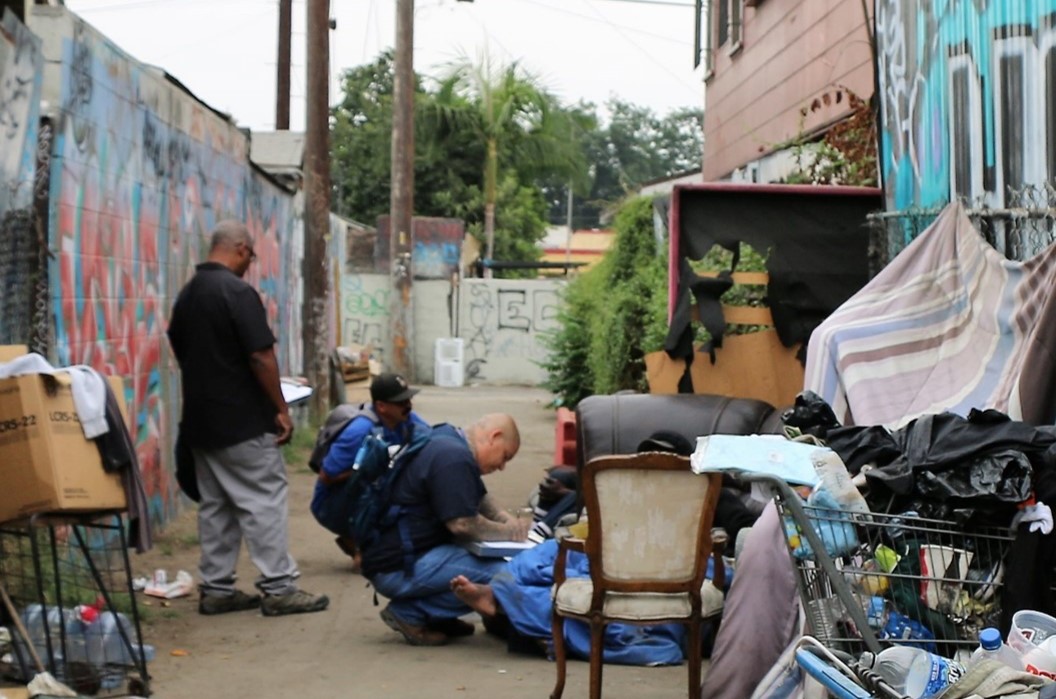 Outreach in South LA Ramps up With Prop 47 GrantLOS ANGELES- The sun is barely up, the marine layer hovers, as the City Attorney’s Prop 47 team hits a growing homeless encampment in South Los Angeles. Peeking into tents and under tarps, the offer of a handshake, a bottle of water and a granola bar might be a life-changing moment for these people who are destitute, addicted and often physically and mentally struggling. |
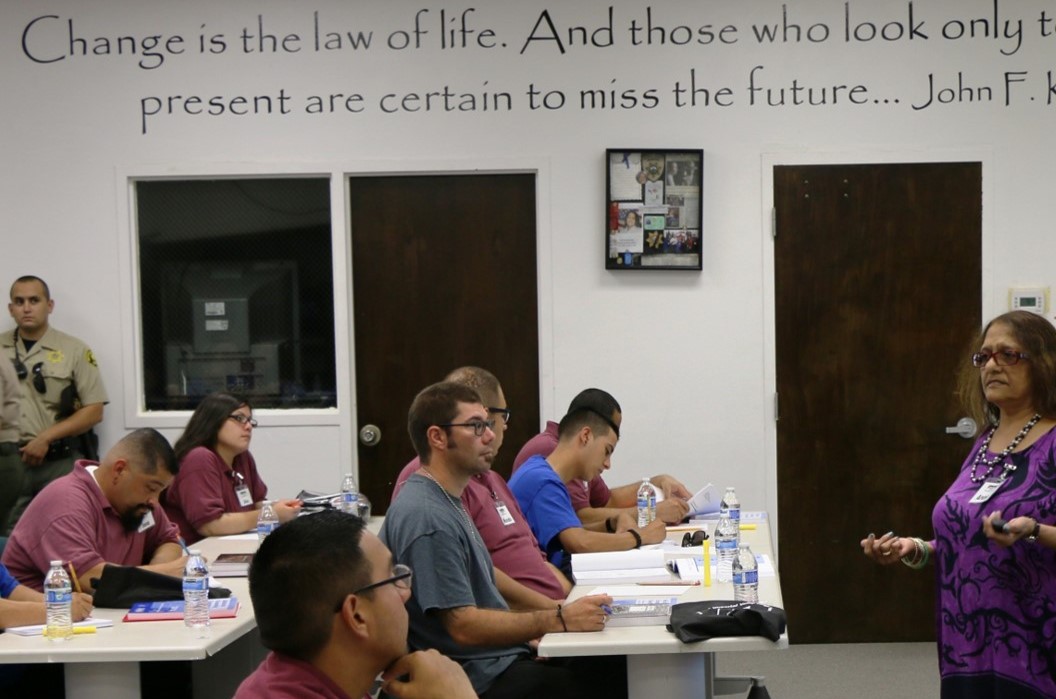 Inside/Out Students Study Together at Imperial JailWhen he dropped out of high school, Pedro thought academics weren’t for him. But in the Imperial County Jail his mind was freed. Because Pedro had been successful in his rehabilitative programming, counselors offered the young father a chance to enroll in a course offered by Imperial Valley College at the county’s day reporting center next to the jail. There, college students take courses for credit alongside inmates serving sentences. “I never thought I would be in college,” Pedro said. “This gives me the confidence to know I can do anything.” Inside/Out, founded at Temple University, is a national program pairing college students with incarcerated men and women to study and learn as equals. It teaches outside students that life can turn on a bad decision and inspires confidence in inside students who might have lacked inspiration and role models in education. “This is one of the best programs I’ve seen in my entire career as a law enforcement officer,” said Sheriff Raymond Loera. Imperial Jail Inside/Out - Full Article |
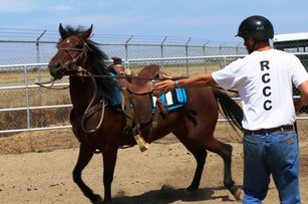 Wild Horse Redemption in Sacramento CountyAt a rustic ranch in rural Sacramento County patient wranglers learn to coax the wildness out of mustangs, while hoping the animals will one day flourish outside of the corrals that have held them since capture. These men persuading skittish horses to trust and connect, be petted and curried, haltered and ridden have a similar dream for themselves. They are AB 109 offenders in the final stretches of their sentences in Sacramento County’s Rio Consumnes Correctional Center. There the federal Bureau of Land Management has partnered in a unique jail training program designed to give a second chance to both these animals who have been rounded up on the range and the inmates chosen to calm them from among the jail’s cognitive behavioral therapy program standouts. “What’s that saying?” Nash Dake asked rhetorically as he brushed the back of a chestnut filly named Big Valley, ‘The outside of a horse does a lot for the inside of a man.’ RCCC Wild Horse - Full Article |
 In LA, New Section 8 Rules Mean Some Felons Can Go HomeDamae Miller’s mother went to prison when the young woman was just 15. Now 25, she is looking forward to helping her mother transition to freedom after a decade in the Central California Women’s Facility at Chowchilla. “They took her when I was young; now we are working on our relationship,” Damae Miller says. But first the Housing Authority of the City of Los Angeles must approve a request that would allow a convicted felon to live in Damae’s apartment leased under the Section 8 Housing Choice Voucher Program, which until recently excluded people convicted of felonies. That rule kept many families from reunifying after a parent or child’s incarceration, even as data showed that a lack of safe and stable housing is a factor in higher recidivism rates. Some local housing authorities have begun to ease the restrictions since a 2011 letter sent by Shaun Donovan, President Obama’s secretary of Housing and Urban Development, encouraged the reunification of offenders with their families in public housing and voucher programs, where appropriate. LA Section 8 - Full Article |
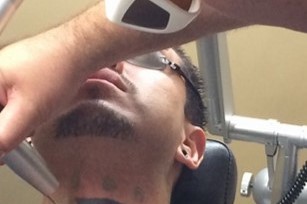 Erasing the Past, One Tattoo at a TimeSTOCKTON — Juan Nila has made a lot of decisions he regrets, but at least one can be erased: the prominent Aztec tattoo across the front of his neck that signaled his membership in a street gang. “I’m trying to change my life around,” he said recently as he clutched paperwork that would admit him into a mobile tattoo removal van. “This is part of my betterment, to make me look more presentable.” The event for 1170(h) offenders was sponsored by the Mary Magdalene Community Services Center, a counseling and job readiness nonprofit in San Joaquin County funded, in part, with Public Safety Realignment money distributed by the county’s Community Corrections Partnership. It was the agency’s first tattoo removal event and more than 75 people showed up, some referred by their probation officers, others from caseworkers at the center. “It’s part of the conversation we have with our clients,” said Executive Director Geneva Haynes. “How serious are these guys about getting out of gangs? Stockton Tattoo Removal - Full Article |
 Dogs, Humans Strive for Second ChanceShannon Plummer is a 53-year-old heroin addict serving time at the James A. Musick Jail in Orange County for felony drug possession. Frosty is her year-old roommate, a lanky white Labradoodle mix whose time was up at the county animal shelter. “I like to say we saved each other,” said Plummer, her blue eyes sparkling as she scratches the pooch’s head. Behind bars for the first time, the lifelong addict had hit her lowest point in life and wanted to change. Janette Thomas gave her the chance through Pathways to Hope, a nonprofit that matches shelter dogs that have behavioral issues with similarly afflicted humans who might learn something from the training experience. “He gave me self-esteem,” Plummer says of her work rehabilitating Frosty. “He gave me confidence and unconditional love. I felt a huge responsibility not to do him wrong.” Canines Offering Life Lessons and Rewards, or COLLAR, is one of four dozen programs offered in the Orange County jails, but one that reaches even those not directly involved in it. Orange County COLLAR - Full Article |
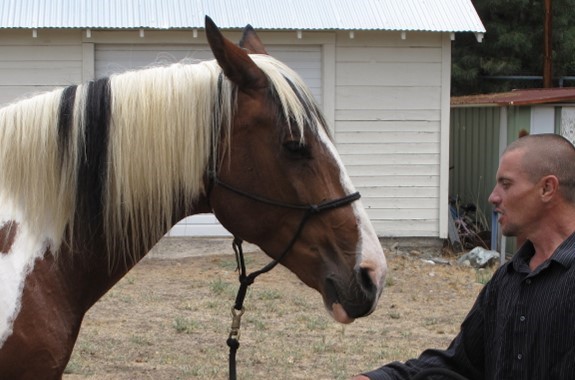 Can Horses Help Offenders Process Destructive Emotions? Success In Siskiyou County Is Riding On It.YREKA – James Lineberger drank too much for too long trying to quell his lifelong feelings of deep anxiety, and eventually landed in jail for domestic violence. Then into his life at the Siskiyou County Probation Department’s Day Reporting Center came Big Dar, a massive paint-colored draft horse. At first Big Dar was skittish and standoffish with Lineberger and wouldn’t come close, mirroring back the feelings Lineberger emitted. Though Lineberger had completed cognitive behavioral therapy classes as part of his probation, translating his new knowledge into feelings, long numbed by alcohol, had eluded him. The horse and man finally formed a bond when Lineberger learned to relax, control his emotional impulses and release his anxieties. “He has taught me a lot about patience,” said Lineberger as he softly stroked Big Dar’s muzzle. “They can feel what you’re feeling, and when you see that and understand what you’re putting out there you can put that straight into real life. You try to be more observant about what you’re putting out there.” Siskiyou Probation Horses - Full Article |
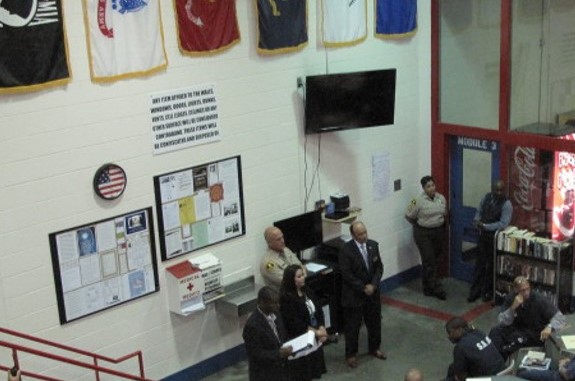 Military Vets Find Support in JailVISTA – In a calm and orderly pod of San Diego County’s Vista Detention Facility the quiet that is a rarity in county jails is interrupted by an occasional “Ooh-rah,” the solidarity cry of the U.S. Marine Corps. The 32 men incarcerated here, from all branches of service, are part of an experiment in which the special needs of military veterans are addressed to improve their odds of success upon release. Post-Traumatic Stress Disorder, traumatic brain injury, depression, anxiety, drug and alcohol issues, flashbacks, nightmares and other war-related emotional afflictions often weigh heavy on military veterans and sometimes are cited as the cause of their legal woes. So in November 2013 the Sheriff’s Department and Veteran’s Administration launched the Veterans Moving Forward Program, a structured and therapeutic jail unit to address veterans’ needs an in a supportive environment. “They volunteered to help our country, now it’s our time to help them,” said Sheriff’s Corporal William Dean Hardy, who volunteered to work with the unit. San Diego Veterans Moving Forward - Full Article |
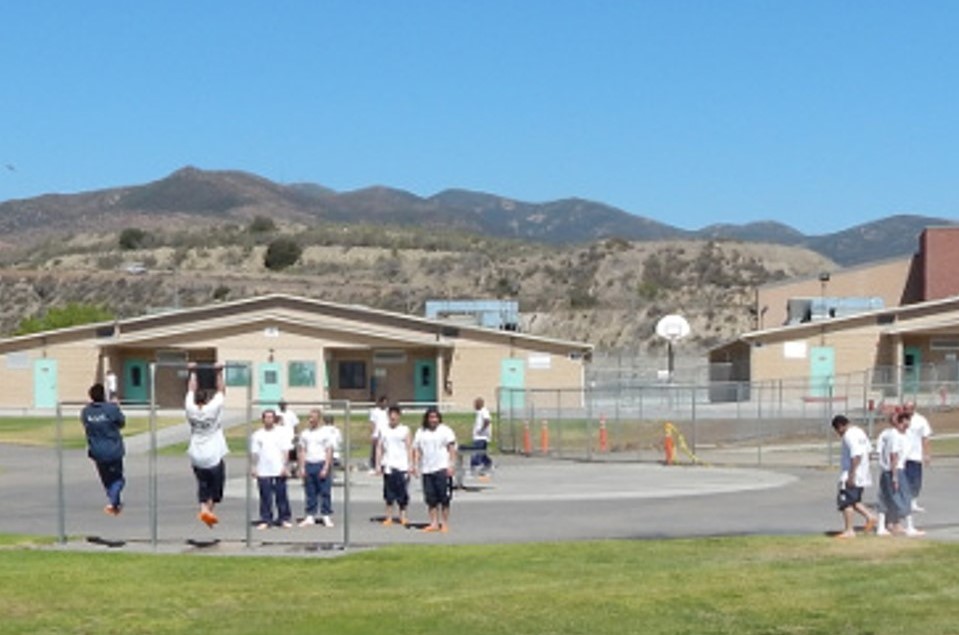 San Diego County Agencies Collaborate on Realignment GoalsIn San Diego County an ambitious collaboration to help Realigned offenders escape from cycles of crime is underway between public safety officials, the courts, probation, the District Attorney, Public Defender and community-based organizations. Agencies that historically have served cross purposes have teamed up in a search for the right mix of programming and punishment that will help offenders turn their lives around. “We have so many ideas, but it’s hard to change cultures,” said Deputy District Attorney Lisa Rodriguez, who trains her colleagues on the legal aspects of AB 109, including split sentences and the evidence-based practices and programs that might be a better option for some offenders than long terms of incarceration. In San Diego County Jails 36 percent of 5,750 inmates are 1170h offenders. Of that number, roughly 400 (as of May 2014) are serving split sentences that include mandatory supervision with program participation after release. The goal is for eligible split-sentenced offenders to finish their time at the 900-bed East Mesa Reentry Facility (EMRF) San Diego Realignment - Full Article |
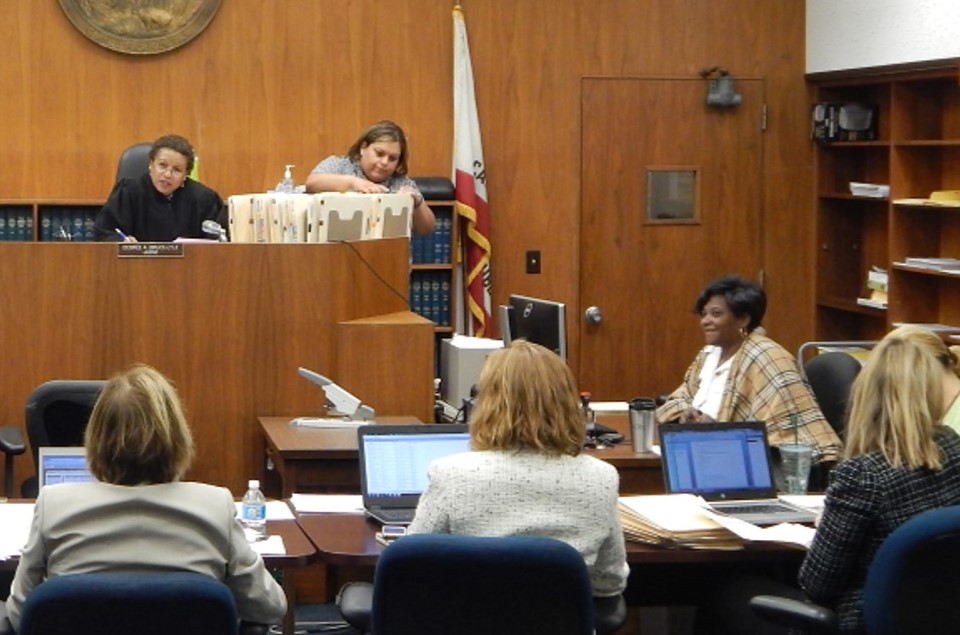 San Diego Invests in Collaborative Courts to Reduce RecidivismSAN DIEGO – The man with the offensive tattoos on his hands was nicknamed Angry Bird when public safety officials here diverted him into a special Reentry Court to deal with issues surrounding his addictions, anger and impulse control. He had been drunk, he told the court, for most of the past 20 years, stealing alcohol to support his habit and starting fights when he was drunk. But on this day, for the past 297 days, he has been sober, more cumulative time since age 15. “My past has been year-long binges,” Angry Bird said. “Now I don’t have to steal a bottle because I’m sick and don’t have the money to buy one. Now I don’t wake up sick anymore.” For the past 18 months, a team of a dozen county public safety and behavioral health officials has invested time and resources into this man and others who were on course to serve life in prison on the installment plan — one addiction-fueled crime at a time. San Diego Collaborative Courts - Full Article |
 Sacramento County’s Adult Day Reporting Center Offers Hope for ChangeBefore now, I didn’t think that I’d amount to nothing or do anything. But as you can see…” Bailey Nelson said as he waved his graduation certificate above his head. Robert grew to adulthood lacking the mental acumen to see how a sketchy situation might deteriorate into something he would regret being a part. “Now before things arise, I stop and say to myself, ‘How is this going to move my life forward?’ I use these skills every day.” Robert is one of a dozen men gathered in a classroom at the Sacramento County Probation Department’s Adult Day Reporting Center, where probationers are required to participate in life skills classes to fulfill their sentences. The Thinking for a Change class uses role playing to reinforce techniques to cope with anger management, impulse control and other exercises of mind over emotions. “I want to say thank you to everyone, especially my Probation Officer. I thank those people right there because they love me the most and are the reason I’m here.” Sac County Hope for Change - Full Article |
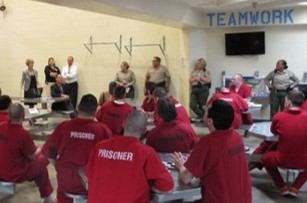 In Fresno, Inmates Learn to Handle Life’s ChallengesOn the fifth floor of the Fresno County Jail 32 men have put aside their gang affiliations and racial and social prejudices for the chance to turn their lives around. These are AB 109 inmates whose risk score was medium to high for recidivism – mostly substance abusers with addictions that propelled their revolving door existence in this Central California lockup. But county corrections officers saw something in their histories, crime patterns and in face-to-face interviews that made them believe these men were ready to change. After passing intensive interviews they are serving the final four-to-six months of their sentences in the county’s Transition from Jail to Community pod, where they will be offered a chance to remake themselves and their lives. “I’m going to show my homies if they do change and take the right steps and get their mind out of the ugliness they’ll have what I’m going to receive – and that’s a better life with the county’s help.” Fresno TJC Program -Full Article |
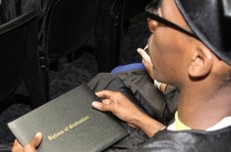 LA County Jail Education Programs Transform Lives“It’s so remarkable to see human intelligence triumph over bad behavior,” Sheriff Leroy Baca of the Los Angeles County Sheriff’s Department. Jan. 16, 2014. “We’re confined, but our minds are always free to learn,” inmate Solomon Brown, 30. “If you occupy their minds you don’t have violence issues. It was a culture change for us, but the buy-in is there because everybody can see the positive changes,” Lt. Joseph Badali. As women in blue scrubs gather around tables in the Los Angeles County Twin Towers Jail, 45-year-old Anna Maria Gonzalez cracks open a workbook and begins to write. The mother of three grown children left school in Mexico in the sixth grade. She was unable to comprehend written English when she began serving five years for possession of drugs for sale. Now she’s on her way to earning a high school diploma in a cafeteria converted into a classroom. “I feel privileged to be here in this class,” she said. LA County Jail Education Programs - Full Article |

